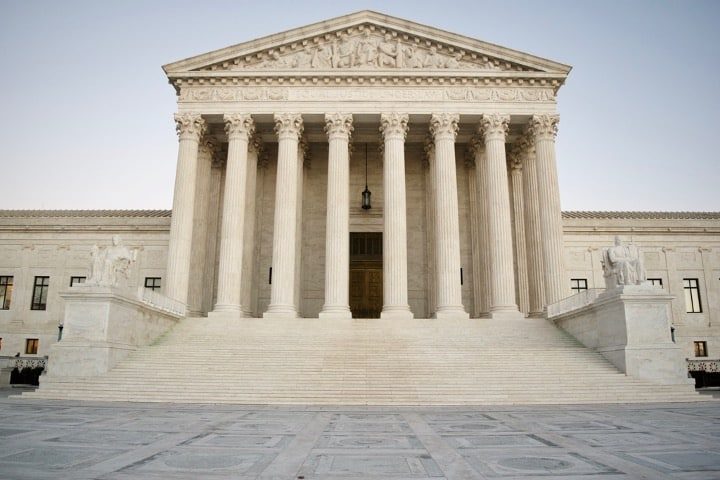
The Supreme Court on Friday agreed to hear the Biden administration’s appeal of two lower-court findings that the administration violated the Constitution in pressuring social-media companies to censor alleged misinformation.
What’s more, the High Court issued a stay of the injunction against such conduct imposed by the lower courts, a move vehemently opposed by three conservative justices.
“At this time in the history of our country, what the court has done, I fear, will be seen by some as giving the government a green light to use heavy-handed tactics to skew the presentation of views on the medium that increasingly dominates the dissemination of news,” wrote Justice Samuel Alito. “That is most unfortunate.”
On July 4, U.S. District Judge Terry Doughty issued a preliminary injunction in Missouri v. Biden enjoining various individuals and agencies within the Executive Branch from communicating with social-media companies for “the purpose of urging, encouraging, pressuring, or inducing in any manner the removal, deletion, suppression, or reduction of content containing protected free speech.”
Doughty found that the “evidence produced thus far depicts an almost dystopian scenario” in which the Biden administration collaborated with social-media companies to suppress dissenting opinions on such matters as Covid-19’s origins, lockdowns and mask mandates, vaccines, the validity of the 2020 presidential election, and the Hunter Biden laptop story.
The administration appealed Doughty’s decision, but the Fifth Circuit Court of Appeals largely upheld it, ruling that the evidence indicated “a coordinated campaign” of unprecedented “magnitude orchestrated by federal officials that jeopardized a fundamental aspect of American life.” The court narrowed the scope of the injunction but allowed it to stand.
Still intent on silencing opponents, the administration then appealed to the Supreme Court, which accepted the case and stayed the injunction pending its decision.
Noting that the lower courts had amassed considerable evidence of “a ‘coordinated campaign’ by high-level federal officials to suppress the expression of disfavored views on important public issues,” Alito, in a dissent joined by Justices Clarence Thomas and Neil Gorsuch, observed:
Today, however, a majority of the court, without undertaking a full review of the record and without any explanation, suspends the effect of that injunction until the court completes its review of this case, an event that may not occur until late in the spring of next year. Government censorship of private speech is antithetical to our democratic form of government, and therefore today’s decision is highly disturbing.
“Under a straightforward application of the test we use in deciding whether to grant a stay, the government’s application should be denied,” Alito declared. Specifically, “an applicant must show, among other things, ‘a likelihood that irreparable harm will result from the denial of a stay.’” But “the government’s attempts to demonstrate irreparable harm do not come close to clearing this high bar.”
Instead of providing any concrete proof that “harm is imminent,” the government offers a series of hypothetical statements that a covered official might want to make in the future and that, it thinks, might be chilled…. But hypotheticals are just that — speculation that the government “may suffer irreparable harm at some point in the future,” not concrete proof. And such speculation does not establish irreparable harm. [Citations omitted; emphasis in original.]
“Moreover,” penned Alito, “it does not appear that any of the government’s hypothetical communications would actually be prohibited by the injunction. Nor is any such example provided by the court’s unreasoned order.”
The administration claimed that the injunction might prevent the President or other Executive Branch officials from expressing their own views, which Alito recognized as patent nonsense:
The injunction applies only when the government crosses the line and begins to coerce or control others’ exercise of their free-speech rights. Does the government think that the First Amendment allows Executive Branch officials to engage in such conduct? Does it have plans for this to occur between now and the time when this case is decided?
Despite all this, “the majority stays the injunction and thus allows the defendants to persist in committing the type of First Amendment violations that the lower courts identified,” wrote Alito. “The majority takes this action in the face of the lower courts’ detailed findings of fact” — a highly unusual move.
Alito explained that he would have denied the stay application while specifying that the government could “apply for relief,” even emergency relief, “in the unlikely event that a concrete occurrence presents a risk of irreparable harm.”
Some plaintiffs in the case welcomed the Supreme Court’s decision to hear it despite the stay.
“This is the worst First Amendment violation in our nation’s history,” Missouri Attorney General Andrew Bailey said in a press release. “We look forward to dismantling Joe Biden’s vast censorship enterprise at the nation’s highest court.”
“We are pleased to learn that the U.S. Supreme Court will hear this case, giving us yet another opportunity to defend the people from this assault on our First Amendment rights,” Louisiana Solicitor General Liz Murrill said in a statement. “It brings us one step closer to reestablishing the protections guaranteed to us in the Constitution and under the First Amendment. We hope that the Supreme Court will agree that this gross abuse of power must stop and never happen again.”
Will the court uphold the Constitution? Will it side with the administration? Or will it try to thread the needle between the two, as it did with ObamaCare? Only time will tell.



